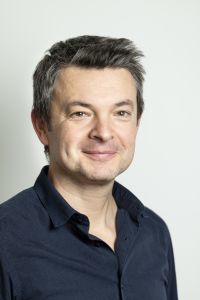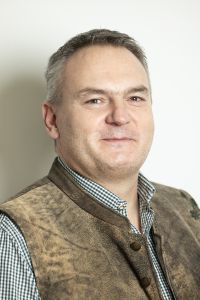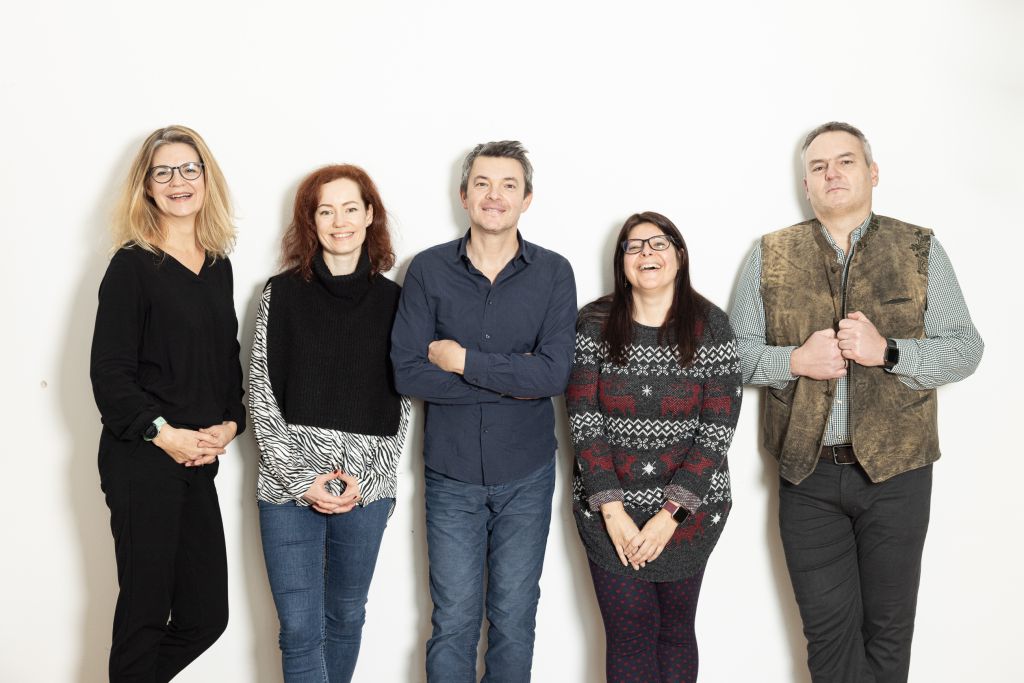Since October of last year, a new leading team has been at the helm of the Leonard Bernstein Department of Wind and Percussion Instruments. Michael Pircher, Michaela Reingruber, and Martin Mühlfellner speak about ongoing projects, the style of teamwork they’ve developed, and the goals they’ve set themselves for the coming four years.

The three of you have been sharing leadership of the Leonard Bernstein Department since October 2023. What have the first few months in your new functions been like for you?
Michaela Reingruber (MR): I’ve found it very refreshing! We’ve known each other for years, and our hunch that we’d be able to work well together has turned out to be spot on. I’ve also got to complement our overall department head: Michael Pircher keeps on top of everything we have to tackle and ensures an optimal flow of information. We’ve also enjoyed smooth communications not only amongst ourselves but also within our own individual areas. And our work together as a team of five, which includes Julia Ostroverkhova (artistic management) and Daniela Sölkner (secretary), has likewise been very harmonious and friction-free.
Martin Mühlfellner (MM): I can second that wholeheartedly. I was initially a bit sceptical about whether this function would be a good fit for me, but the way the various responsibilities are divided up between us makes it possible to shoulder the additional work. So I think we’re on a good path towards making things happen over the next four years.
Michael Pircher (MP): Unlike my deputies, I knew what I was getting into since I’d already put in eight years as deputy head and seen it all from the number two position. Our former head, Barbara Strack-Hanisch, did a truly fantastic job and turned everything over to us in great shape, so I now feel really good looking back upon this first semester as her successor.
In terms of getting things done and the responsibilities that we bear, I view us as equal partners.
Michael Pircher, department head
You mentioned a division of responsibilities. How does that look?

MP: We’ve divided the wide range of department leadership tasks amongst ourselves. I’m responsible for budget and personnel, for example. But in terms of getting things done and the responsibilities we bear, I view us as equal partners.
MR: My responsibilities include events, though Michael’s also frequently involved here as department head. My events-related work keeps me in constant contact with our artistic management. Scholarships are also within my purview. But in our department’s everyday life, the various areas overlap quite often—and looking at certain things as a group is both very nice and a relief for all three of us.
MM: We always make important decisions together, in any case. As for my areas of responsibility, I take care of orchestra-related things as well as cooperative relationships like the one with the Tyrolean State Conservatory.
How do you conceive of your work and/or complement each other as a team?
MM: All three of us studied together at the mdw, so we’ve known each other for 25 years. Neither during our studies nor as colleagues later on have we ever had any differences.
MR: We also have experience playing together in orchestras as well as very similar basic outlooks. Openness and humour ease our work as a team, and we help and support each other when needed.
Are there some initial themes that you’ve already been working on?
MM: From my standpoint, a big and important theme is communication between departments as such and between people in different areas of work—like between me and the Orchestra Office, for instance—but also between the department heads and teaching faculty. That’s something I’ve started trying to focus on more.
MP: That just comes with the territory at such a big institution, and getting things moving in this respect is a process. A topic that I’d single out is the problem of practice rooms at our university. I’m familiar with this from my own studies here, and it’s something we’ll definitely be dealing with for some time to come.
MR: As a university, we’re under no obligation to provide spaces for individual practicing—but we do hear how it’s a big issue for our students. And we’re making an effort to find some solutions, here, in part because we know how difficult it is to take certain instruments home.

MP: What constantly occupies our team and takes a lot of time, however, is everyday stuff—things like drawing up and managing our budget or communicating with our faculty members.
MR: There are days where you feel like all you’re doing is putting out fires while you should actually be concentrating on your teaching. To manage that, I sometimes have to turn off my mobile phone and leave organisational issues for afterwards. After all, the students just do take priority.
Can you say approximately how much time you put into your work for the department?
MP: I definitely need multiple hours each day for what I do as department head. Unfortunately, a lot of people just don’t realize what kind of time commitment this function entails.
MM: I didn’t, either—even if I was under the impression that the time and energy required above and beyond teaching and orchestral playing was considerable. That’s since proven true in many respects. But with the various responsibilities divided up between us, we’re managing it pretty well. I do still need a lot of time for things I’m not so experienced at—but that’s constantly improving.
MR: You gradually get to know the people you’re dealing with and figure out who you need to turn to—which also saves time. One positive aspect of being in a leadership role is being able to influence what happens at the University. I’m thinking here of a workshop we had today on smooth sequences of mouth and facial muscle motions in wind players. That topic was of great interest to all three of us. We’re also thinking of holding a workshop on sport psychology and ways of transferring the associated tools, like those used in preparing for competitions, to our work as musicians. I really like how we’re able to think about and decide on focuses like that.
We’ve known each other for years, and our hunch that we’d be able to work well together turned out to be spot on.
Michaela Reingruber, deputy department head
What are each of your personal objectives for your period in office? Are there any concrete points you’ve chosen to work on?

MP: Lots of things like competitions and cooperative undertakings are already in the pipeline. But new tasks and projects that need to be dealt with come up on a constant basis. Over the next few years, we’ll be working towards the agreed-upon targets for our department, holding hearings to fill vacancies that come up, and dealing with lots of things that we don’t have any inkling of as of yet. But we’ve also got our own visions about things like the practice room issue, a suitable storage space for percussionists, and inventory software. Which may not sound particularly exciting—but if I can say four years from now that we’ve managed to realize even some of these, I’ll be proud.
MR: This year, we’ve got a number of major projects on our plate. For KlangBildKlang, my colleague Alvaro Collao León and I have submitted a project that will have seven saxophonists move around the performance space supported by choreography, live electronics, and visuals. We’re teaming up with the University of Applied Arts Vienna to realise it all. The necessary organisational work is huge, and I’m happy that this project can count on support from the department’s entire leading team.
I think we’re on a good path towards making things happen over the next four years.
Martin Mühlfellner, deputy department head
MM: My goal is to put our cooperation with the Tyrolean State Conservatory on a good footing. The point here is for students from Innsbruck to be able to continue their studies at the mdw once they’ve finished there. We’re quite generally looking to reduce any hesitance out there and provide easy, barrier-free access, and that applies especially to places of training that are farther away—like in Tyrol or South Tyrol. So I’m working to facilitate good exchange.
MR: Another one of our objectives is to help keep the mdw attractive and modern. We want both students and teachers to enjoy coming here, which requires a good feel for young people as well as for teaching. Everyone, whether they’re students or teachers, needs to be heard. That’s very important to me.

What are your hopes for the coming years as department heads?
MP: I hope we’ll be able to keep working on our communication and maintain constant exchange with the Rectorate, with students, and with all of our institution’s employees despite how full our calendars are.
MR: Personally, I need to draw clear boundaries between work and free time—in other words, between my teaching, my departmental responsibilities, my work as an active musician, and the rest of my life. That’s not always easy, but I do think that everyone benefits when a person succeeds in striking a good balance. That’s partly one’s own responsibility, of course, but it’s also important that expectations be appropriate and that those boundaries get drawn in time. The ability to accurately assess one’s own capacities is something that needs to be properly appreciated.

